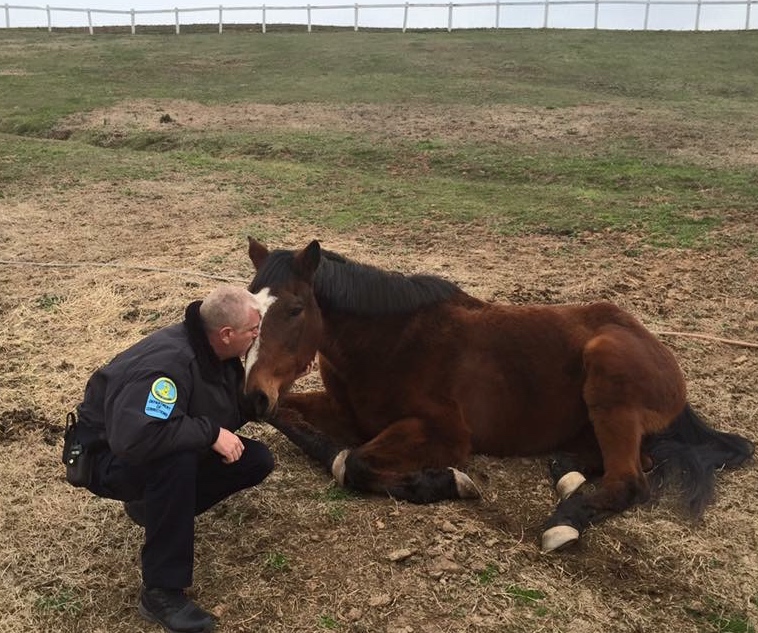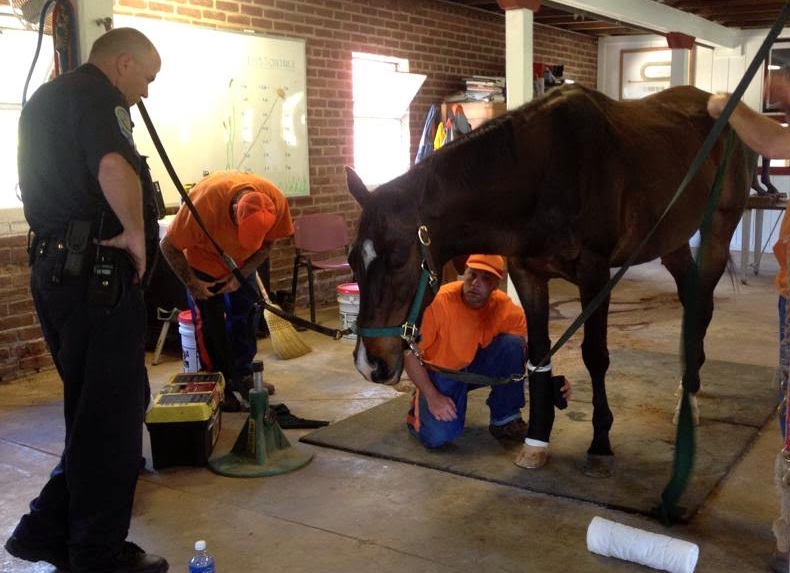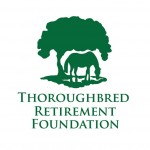
Officer Shane Clarke of the Virginia Department of Corrections plays an integral role in the Thoroughbred Retirement Foundation’s racehorse/prisoner program Second Chances. Pictured with one of his favorite ex-racehorses, Toasty.
Officer Shane Clarke of Virginia’s James River Work Center never gets tired of hearing the voices of paroled inmates who call him on the barn phone; the very barn that was at once a humble home for horses and a kind of schoolroom, where those dispossessed learned to pick hooves, feed and interact with 1,200 pound animals who in turn helped them find their way.
“I’d say that when I hear from guys who’ve gotten out of prison and are doing well, that’s about the greatest part of my job,” says Clarke, an officer with James River Work Center for 15 years, 10 spent working in the Thoroughbred Retirement Foundation’s prisoner/racehorse program, Second Chances. “When they call, it tells me they thought enough of the program to keep in touch. I heard from one guy who told me he and his wife are doing well, and they’re having a child. And another who just wanted to say hi and ask how everybody’s doing.”
Since James River accepted its first retired racehorses 10 years ago, and began training inmates horsemanship skills, Clarke has been an enthusiastic mainstay of the center, the prison farm, and on weekends off, the volunteer cook at many an Open Barn.
In this week’s Clubhouse Q&A, Clarke discusses how his career path led him to the Virginia Department of Corrections and the horsemanship program he admired so much, such that he jumped in and took the classes himself.
Q: How’d you wind up at the TRF’s James River program?

Clarke with his favorite TRF retiree, Scary Guy.
About 15 years ago I was working for Verizon and loved it. But as cell phones got more popular and people got rid of landlines, which in turn cut out the “trouble calls” I assisted with, our workload lessened, and I was laid off along with 41 other technicians. At the time, my wife and I had just built our home and my son was six months old. So I went to my next-door neighbor, who worked for the Department of Corrections, and asked how he liked working there. I heard good things and decided to apply for a job. I’ve been there ever since.
Q: What did you think when you first heard that horses may come to James River?
The first word I got about it came from Heather Mitchell, a counselor at James River at the time. She worked for the Department of Corrections and told me they were trying to get a horse program started here. I was ecstatic. Both my grandparents and my parents had horses. My grandparents rode Thoroughbreds and Arabians, and my mother rode and showed Quarter Horses. So, when I heard, I immediately told my supervisor I wanted to be a part of it.
Q: What is your role in the TRF’s Second Chances program?
First and foremost I was brought down here for security. But, once I met Dr. Reid McLellan (the developer of the Second Chances training and classroom materials) I decided to take the same courses the guys were taking. I’d be silly to be down here if I didn’t know how to take care of horses myself, so I asked if I could get the book, and I studied and took the exams with the inmates.
Q: Does working together with horses ease any tension that might exist between law enforcement and inmates?

Clarke and inmates see to the care of one of 28 racehorses retired at the Thoroughbred Retirement Foundation’s James River location.
Well, I very seldom butt heads with any offenders. I give them respect and they give it back. I understand that we all mistakes and as for the guys coming through the program, most of them know who I am, and am hoping they would say I’m a good guy. We’re all a big family around here.
Q: What are your best memories from the farm?
Mostly it’s those moments when I hear from the guys who’ve left the program and have gotten out. When I hear from them that they’re on their feet and doing OK, those are the best memories. Or when we’ve had some of the guys come back to teach, like we have with three of our farriers. These men have gone on to become professional farriers, and they come back to tell the new guys what they’re doing. Some of them are newly married, and they’re all doing well. That’s pretty gratifying.
Q: You’ve also watched many transformations in your time.
Being down here all the time, I see the changes that take place everyday. As a new horse comes in, I watch how they change. They’re not pushed here, and they live out in a herd, and it really transforms them. And some of the new offenders coming in are usually a little nervous to start, and they should be working around a 1,200-pound animal, so it really means a lot to watch how they all learn to adapt to one another.
We have 28 horses now, including two descendants from Secretariat—Covert Action and Multiple Choice. But my favorites are Scary Guy, a huge horse, and Toasty, who lived to be 32 before he was euthanized.
Q: I understand you wear several hats around the barn?
I like to help out as much as I can. When we have Open Barns for the general public, I come in on my days off to cook hamburgers and hotdogs for the public. Or if we have any other special event, I like to be part of it. I bring my family, and they love it.
Officer Clarke is one of the individuals within the Thoroughbred Retirement Foundation who helps ensure a long and happy life for retired racehorses and a path to healing for prison inmates.


I am openly touched to my heart ❤️; this is true rehabilitation, on all levels, beginning to happen for man and for horse …
Blessings to all, your hard work is greatly appreciated????????????